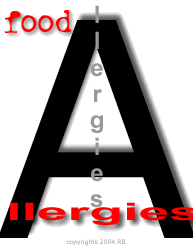|
Article # 3
If you are
certain that you have an allergy, be sure to avoid that food by checking
packets and labels of anything you eat, and being extra-careful when
eating out in restaurants. If an itchy reaction has already started,
antihistamines may help, but discuss this with your doctor. If there is a
risk of anaphylactic shock (circulatory collapse), an adrenaline injection
can be carried by the sufferer, who should also tell friends how to inject
them if an emergency arises.
What's the difference between an allergy and intolerance?
Intolerances - or food sensitivities - are more common than allergies and
do not cause the same immune response. With an allergy, a tiny amount of
the problem food can cause a reaction, whereas an intolerance usually
requires a larger quantity to be consumed for a reaction to take place.
Often the symptoms of food intolerance start some time after eating the
food, which can make the condition difficult to diagnose.
Common symptoms include: flushing, abdominal pain, vomiting, and diarrhoea.
What causes intolerance?
In lactose (milk) intolerance, sufferers lack the enzyme to digest the
milk sugar. In some countries such as Thailand, more than two thirds of
the population are lactose intolerant, although it is much less common in
the UK.
Reactions to certain food additives, such as sulphites, monosodium
glutamate, and caffeine.
Certain people are sensitive to the effects of a chemical called
histamine, found naturally in some foods.
Detecting intolerances
If you suspect that you have a food intolerance you should visit your GP
before cutting out any food groups entirely, which could result in your
diet falling short of vital nutrients. Only after you have been properly
diagnosed should you avoid the problem food - preferably under the
consultation of a GP or nutritionist.
Top
Online source:
www.thesite.org/youthnet/jsp/polopoly.jsp?d=290&a=3031
©
copyright 2004
www.saibabaofindia.com/sathwicfood |
